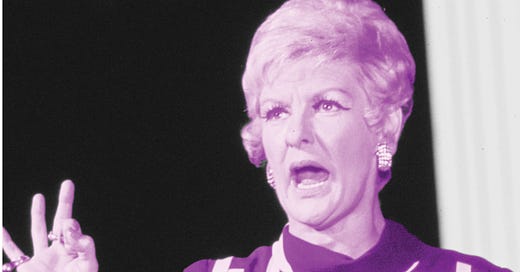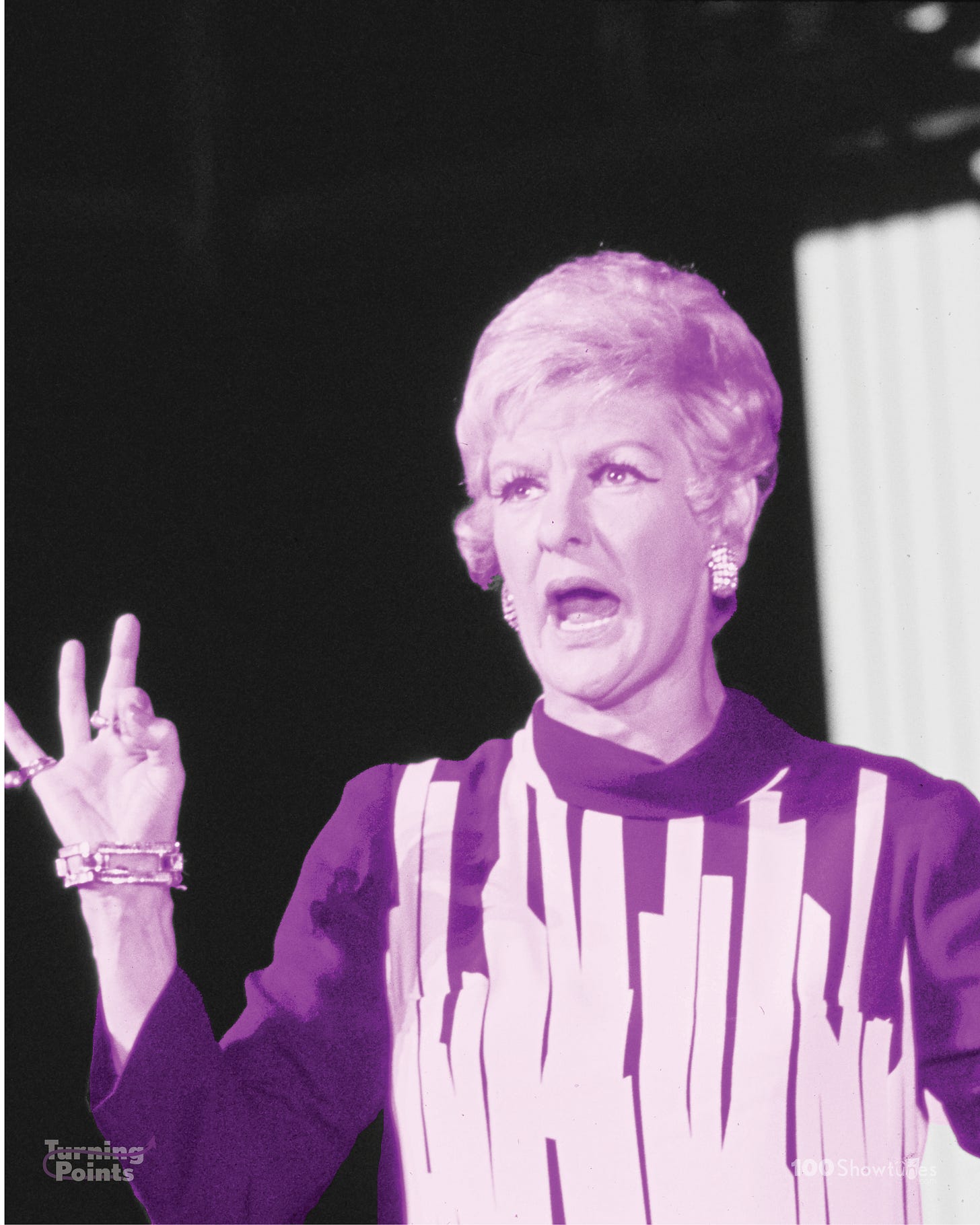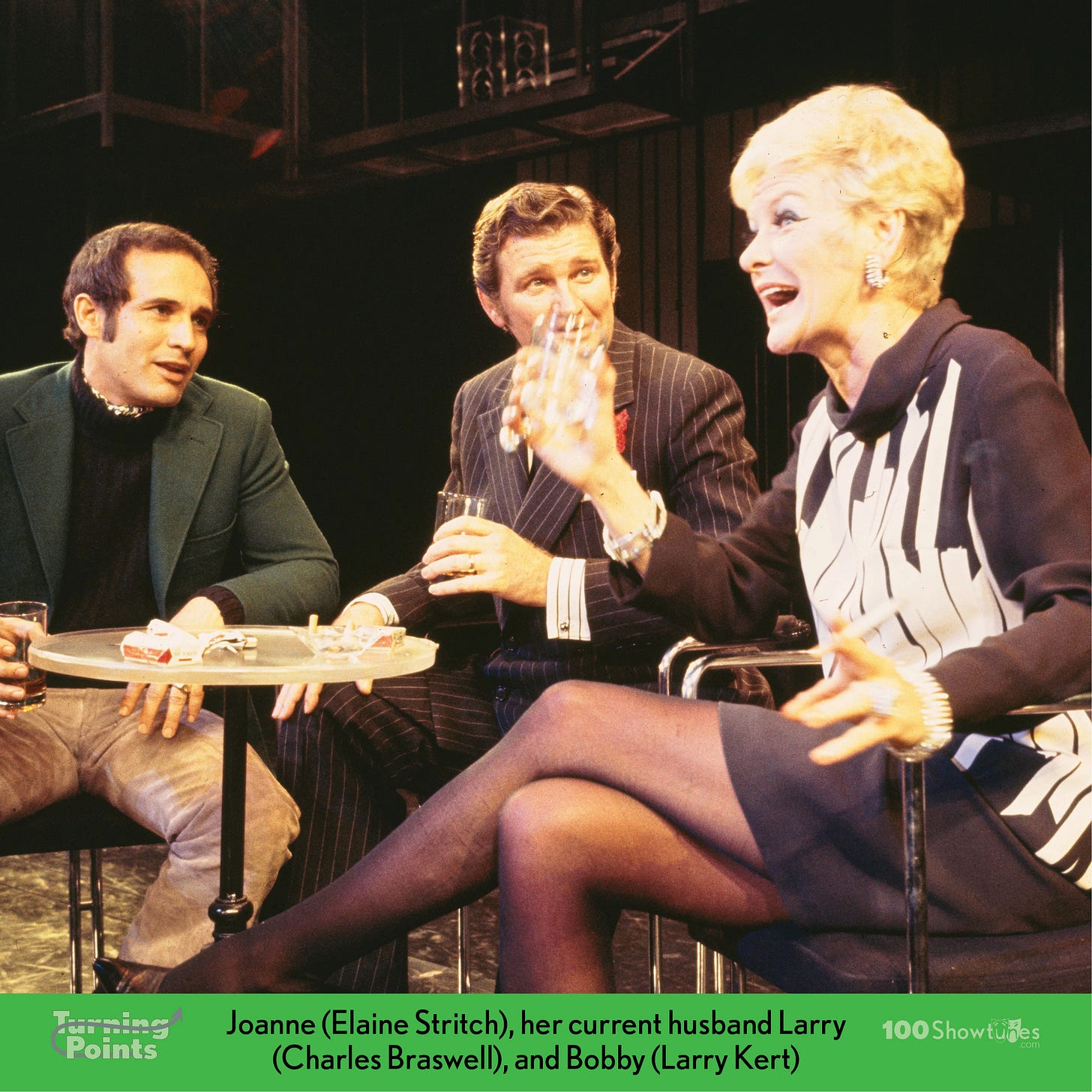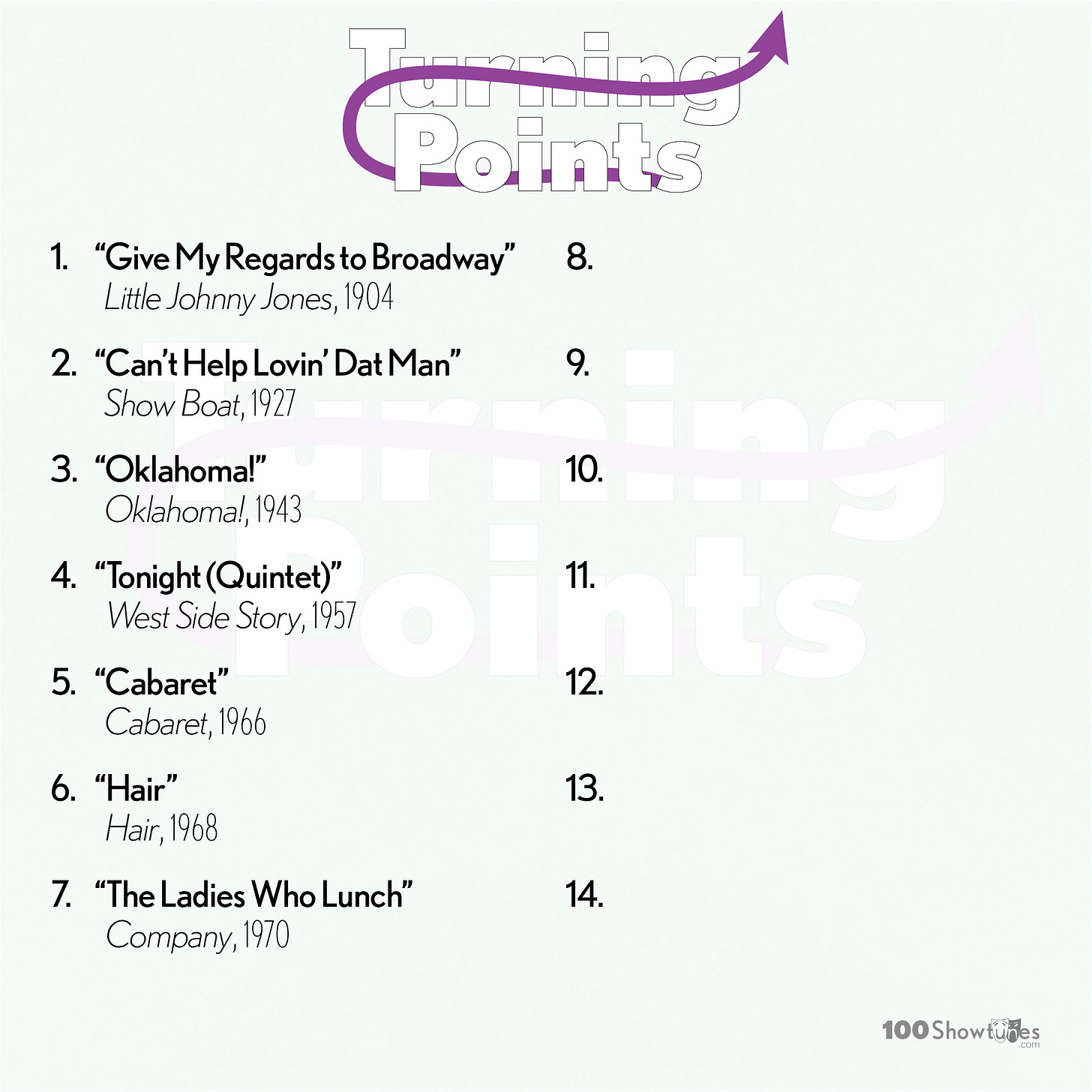No. 7. “The Ladies Who Lunch”
COMPANY (1970). By Stephen Sondheim (Music & Lyrics) and George Furth (Book).
Summer 1970. You’re seated for the new musical Company. The set looks like a cross between a jungle gym and a Mondrian painting—an arrangement of cubes in steel and plexiglass that feels like an apartment building or skyline. You’re at a surprise party for Bobby—a handsome bachelor turning 35—hosted by his married friends. In the scenes that follow, Bobby visits each couple as the others observe from their respective nooks on the set. It doesn’t really have a plot, per se. It’s an exploration of themes related to marriage and the need for human connection. The songs here function much as they did in Cabaret, commenting on the action or making a stand-alone observations. The score doesn’t sound like pop music, nor does it come from any sort of classical tradition. With smart and pointed lyrics, it feels like a score that can only exist in the world of this play with these characters. Near the end of the evening, Bobby is at a night club with his acerbic and inebriated friend (Joanne, who has had the best jokes of the evening thus far), and her 3rd or 4th husband (Larry). Joanne sings ”The Ladies Who Lunch,” a caustic, cynical toast to different types of society women.
By now, we’ve seen the creations of “Musical Comedy” (Little Johnny Jones) and the Musical Play or “Golden Age” musical (Oklahoma). Now we have come to “The Concept Musical” which uses theatrical conventions to explore facets of complex themes rather than a linear narrative. While there are some previous examples of what could be considered “concept musicals,” they weren’t embraced and emulated in the way Company was and continues to be. Company’s collaborative spirit set it apart. Hal Prince read some short plays by George Furth and decided they should be a musical, bringing on Stephen Sondheim, choreographer Michael Bennett, and set designer Boris Aronson early in the process, and every department worked in sync to bring the ideas to life1. Sondheim’s score redefined how music written for theater could speak to the complexities and anxieties of the modern age. Although this is technically the third Broadway score for which he wrote music and lyrics, it’s the show that established him as an industry-changing force. The Sondheim-Prince collaboration (often with Bennett and/or Aronson) would continue to break ground throughout the 1970s.
Recommended Recording: ”The Ladies Who Lunch,” Company (1970 Original Broadway Cast)
Elaine Stritch2’s performance is absolutely essential listening for anyone who wants to have any conversation about musical theater ever in their lives. The song was written specifically for her. In Sondheim’s collected anotated lyrics, Finishing the Hat, he talks about how Stritch’s personality inspired the song, recounting an evening in which she went into a bar “well oiled” and said to the bartender, “Just give me a bottle of vodka and a floor plan.” It’s a signature number that Stritch performed and recorded throughout her life. She referred to this song as a three-act play, which is correct. But it’s also a sexy-as-hell bossa nova bop. Her difficulties recording this song became the main dramatic arc of the D.A. Pennebaker’s invaluable documentaryOriginal Cast Album: Company. The documentary also features orchestrator Jonathan Tunick and record production Thomas Z. Shepherd, both of whom would have long, influential relationships with Sondheim, Prince, and musicals in general.
Alternate Performances
Company has received 8.5 cast recordings. (The 0.5 is because the 1970 Original London Cast Recording is just the OBCR with Larry Kert’s vocals replacing Dean Jones’s as Bobby.) “The Ladies Who Lunch” is a favorite of divas and cabaret artists, and no Sondheim tribute or review is complete until it’s performed. A teenaged Anna Kendrick sings “Ladies…” in the classic 2003 film Camp after poisoning her costar and taking over the role with the line, “She's f—d, I'm ready, and the goddamn show must go on. So let's get cracking, shall we?” It also pops up on Doom Patrol and Riverdale.
1995 Broadway and London Revivals: Company received a pair of revivals in 1995. First, Scott Ellis directed a Broadway revival with Boyd Gaines and Debra Monk as Bobby and Joanne. Sam Mendes directed the London revival3, which starred Adrien Lester and Shelia Gish. Monk and Gish each deliver strong (if not particularly notable) renditions of “The Ladies Who Lunch.” The productions shared two things in common, which set the tone for many subsequent revivals: An updated to script that could passably take place in “The Present,” and the addition of “Marry Me a Little”—an earlier draft of the finale, “Being Alive”—as an Act 1 closer for Bobby. I could argue that neither of these choices were necessary, but at this point Company has existed longer with them than without, so I’ll just let-go-let-God.
2006 Broadway Revival: This production, directed by John Doyle, featured a cast of actor-musicians. It’s an elegant production with pacing that I find revelatory, decadent, or over-indulgent, depending on my mood. It understands the Bobby-Joanne relationship better than any post-Prince production. Barbara Walsh is svelte and steely as Joanne. As she sings her finale “Rise”-s at the end of the song, an actor-pianist gets up and and walks away, leaving her to continue screaming in silence before turning her attentions to Bobby (Raul Esparza). She stares him down for what feels like an eternity before propositioning him. When she says, “I’ll take care of you,” and he responds “But who will I take care of?,” you can feel the weight of that revelation, and it sets up the most effective version of “Being Alive” seen to date. The production yielded a great cast recording and a proshot (that fades in and out of availability).
Patti LuPone:At some point, forces conspired to make “Ladies…” into a Patti LuPone specialty number. She sang it as part of the “red dress” segment of Sondheim! The Birthday Concert before playing Joanne in a 2011 Concert staging of Company. (Both performances have potshots that are occasionally commercially available.) She “came out of retirement4” to play Joanne in a 2018 London Revival directed by Marianne Elliot. This revival swapped Bobby’s gender (she becomes “Bobbie”) and updated the arrangements and some lyrics to change the setting to the even more present day and accommodate the various script changes. The London production made a cast recording before moving to Broadway with LuPone and an otherwise entirely new cast (which was not recorded). Patti promptly turned in her equity card when the Broadway production closed, re-announcing her retirement5.
Is it Covered by The Rat Pack, Audra McDonald, or Glee?
Audra McDonald: Take Me to the World: A Sondheim 90th Birthday Celebration was the giddiest collective experience for musical theater lovers during the Covid lockdown in 2020. The collection of segments (recorded by Broadway greats in their respective homes) was supposed to feature live introductions by co-producer Raul Esparza, but technical glitches caused a lengthy delay during which theater fans congregated in group chats and on social media. The evening ultimately included a string of wonderful performances, culminating in “The Ladies Who Lunch” performed as a trio with Christine Baranski, then Meryl Streep, then Audra McDonald singing a verse.
Glee never presented “The Ladies Who Lunch,” but on season 4 episode 9 (“Swan Song”), Kurt sings Company’s finale, “Being Alive,” to re-audition at NYADA. In season 4 episode 14 (“I Do”), Emma sings “Getting Married Today,” Company’s hilarious patter song for a conflicted bride.
In the Wings
And just like that, we’re halfway through the Turning Points! While you wait for No. 8 to drop, you may to check out the spot-on, incredibly niche parody documentary, Original Cast Album: Co-Op, featuring John Mulaney as an ersatz Sondheim.
For example, at the end of the opening number, the company—which is scattered across the set as if in separate apartments—converges in an elevator center stage that descends to meet Bobby as they hold a single note (“we looooooooooooooooooove you”). That note is timed perfectly with the music, as if every single creator on the show was working in unison.
Yes, the same Elaine Stritch who played to Hair destroying crusader on the episode of Head of the Class I mentioned last week! She is better known for this.
This production was taped for BBC and can often be found on YouTube.
Not a single person believed she was actually going to retire.
Again, no a single person believed she was actually going to retire, and she reappeared on Broadway 2 years later.








Now we’re cooking